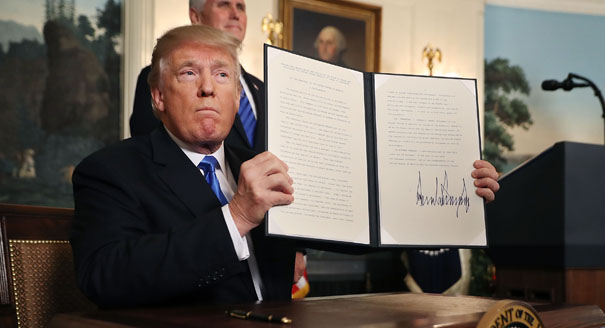President Donald Trump’s announcement on December 6 recognizing Jerusalem as Israel’s capital and beginning the process of moving the U.S. embassy to the city marked an abrupt and profound change in longstanding U.S. policy on a key issue at the heart of the Israeli-Palestinian conflict. The president made his decision in the face of dire warnings from Arab and European leaders and reservations by some within his own administration about its ramifications.
The reaction from Palestinians has been furious, with Palestinian factions calling for demonstrations and President Mahmoud Abbas questioning any future role for the U.S. in advancing Middle East peace. Given these developments, is there any way the quest for Middle East peace—what Trump has called the “ultimate deal”—can move forward? Sadly, the answer is probably no, at least not under the Trump administration. This reckless step has badly damaged the president’s standing with Palestinians, and it is unlikely that they can now be convinced to trust him as an honest broker in negotiations with Israel. However, the Israeli-Palestinian conflict has not disappeared. Both Israel and the Palestinians still seek peace and recognition that can only come through a negotiated end to their conflict. It’s not too soon to begin to think about how to get there.
Jerusalem is the “third rail” of Israeli-Palestinian peace, and all previous U.S. presidents going back to Harry Truman have wisely avoided touching it. The issue of Jerusalem is so difficult because it is related not only to the national identities of the two sides but also to the religious sensitivities of the three monotheistic religions. Successive Israeli and Palestinian governments have staked out rigid and incompatible positions on the issue. For Israelis, Jerusalem (within its expanded municipal borders) is the united and eternal capital of Israel. For Palestinians, peace must include a Palestinian state with East Jerusalem as its capital. Because of the city’s religious significance, public opinion on both sides is even more uncompromising. Yet, an end to the conflict can occur only if the two incompatible positions are somehow reconciled. The United States, as the chief sponsor of peace efforts over many decades, has until now held to the position that the status of Jerusalem can only be resolved in Israeli-Palestinian negotiations.
Trump’s announcement clearly put the U.S. on the Israeli side of this most divisive issue and offered little to the Palestinians to soften the blow. The president did say that the U.S. was not taking a position on any final status issues, including the specific boundaries of Israeli sovereignty in Jerusalem that would be up to the parties to decide. However, his formal recognition of Israeli interests in Jerusalem was not matched by any words about Palestinian interests or aspirations in the city.
The president justified his decision by explaining that he was only recognizing a reality that everyone already knew: the Israeli government is located primarily in West Jerusalem and American and other officials routinely conduct business with their Israeli counterparts there. However, this missed the point. Trump’s announcement effectively adopted an attitude of “what’s mine is mine, and what’s yours is negotiable.” As more facts on the ground established by Israel become accepted—in Jerusalem and the West Bank—there is less and less room to negotiate a mutually acceptable compromise. And there is less incentive for Israeli governments to negotiate in good faith with the Palestinians if they can get what they want unilaterally with U.S. support.
The current status quo favors Israel, and many Israelis believe there is no need under these circumstances to make difficult compromises to achieve peace with the Palestinians. However, there is no guarantee that Israel’s current prosperity and security can continue indefinitely while several million Palestinians are deprived of their political rights. Trump’s announcement on Jerusalem, which many Palestinians will see as removing the last shred of hope for a negotiated peace, may hasten the day the status quo is no longer so comfortable for Israel.
Given the strongly negative reaction to Trump’s announcement by the Palestinians and their supporters, it is very difficult to see how any peace plan put forward by this administration can move forward. Palestinians rightly question how the U.S. can be a fair intermediary in a peace process when it took Israel’s side on the most sensitive issue even before negotiations could begin. They will also conclude that the U.S. is more attentive to Israeli political considerations than to any sensitivities on the Palestinian side. While the Palestinian leadership will look for ways to contain the damage and keep some hope for negotiations alive, they will be greatly constrained by popular pressure not to be seen as “abandoning” Jerusalem.
What could bring the Palestinians back to the table in the future? The obvious answer is a parallel U.S. statement about East Jerusalem as the capital of a future Palestinian state. No other step could realistically provide the Palestinians with the cover they will need to reenter permanent status negotiations with Israel. Russia took this parallel approach earlier this year when it recognized West Jerusalem as Israel’s capital, and at the same time expressed support for East Jerusalem as a future Palestinian capital.
However, this formulation is not palatable to the Israeli government, as it effectively divides Jerusalem. That is presumably why Trump did not take the Russian approach in his announcement and why he is unlikely to do so in the future. So it will probably be left to a future administration to find a way forward. However, it will have to address the difficult issue of Jerusalem at the outset thanks to the Trump administration’s reckless break with past U.S. policy. Until then, one can only hope that the situation will not deteriorate so badly as to kill even the dim hopes for peace that still remain.






